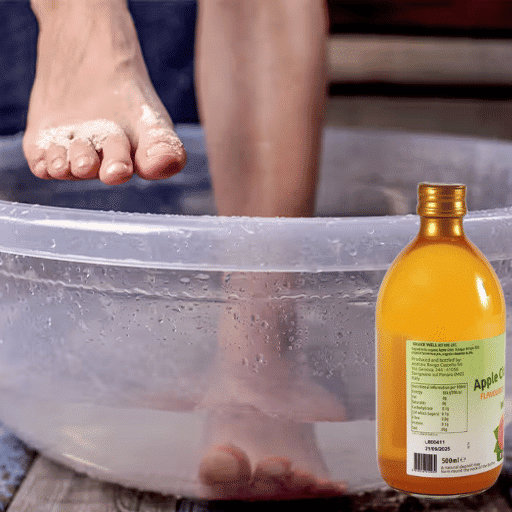Introducing different methods into your weight loss program can help you meet your weight loss goals in a safer and more effective manner. This article discusses how applying Apple Cider Vinegar on Feet Weight Loss goals that can be achieved safely and more easily. Considering the many alternative health approaches available, there are reasons to believe this method can help you lose weight. For example, if you want to lose 15 pounds before Christmas, this approach could assist you. The purpose of this guide is to provide insights on how to properly combine these practices with healthy eating, exercising, and other beneficial activities to reach your target weight in a shorter period of time.
What Do Scientists Agree on Regarding Apple Cider Vinegar for Losing Weight?
Apple Cider Vinegar on Feet Weight Loss
The key reason for using apple cider vinegar (ACV) for weight loss is the component of acid in vinegar. Studies show that acetic acid can enhance metabolism, reduce fat buildup, and control sugar levels, which is pivotal for maintaining weight. Moreover, ACV can help people feel full, resulting in less eating. Some research has also noted that when used with exercise and a low-calorie diet, ACV can effectively help reduce some weight. Nevertheless, it’s worth mentioning that the evidence looks encouraging. Still, the effects are usually more moderate, so consider it as a complete answer to why one has weight rather than the main answer.
What Are the Effects of Apple Cider Vinegar on Metabolism?
There are many ways in which apple cider vinegar has been shown to impact metabolism. Firstly, the consumption of ACV aids in smoothing out one’s blood sugar levels since, as it slows down the gastric emptying rate, insulin consumption improves as well. According to study that has been conducted, when overweight women consumed apple cider vinegar for a month, their insulin sensitivity improved substantially, and furthermore, their triglycerides and blood glucose were significantly reduced alng with their overall insulin levels. A lot of individuals across the globe believe that the consumption of apple cider vinegar increases the overall efficiency of metabolism I the range of 10 to 30 percent however, dietary habits and physical activity greatly impact these claims, more research and confidence are needed to further endorse this statement. It is furthermore impressive how apple cider vinegar can prevent the body from converting carbohydrates into fuels until they are absolutely dire. humiliating the body and transforming it into an ideal state, overtime over time evaporating body fats.
What Are the Primary Constituents in Apple Cider Vinegar, Which Assist in Losing Weight?
1. Apple vinegar weight loss potential – Bioactive ingredients
- From the many bioactive compounds found in apple cider vinegar, it is indicated that they may help in losing weight. These constituents and how they are believed to work are as follows:
2. Acetic Acid (4-8% concentration in ACV)
- Acetic acid is scientifically proven as the major active component of acetic vinegars and is used to alter fat metabolism. Some studies suggest that it might increase the rate of fat breakdown, decrease the amount of fats deposited in the body, and bolster the feeling fullness by slowing down the rate at which food exits the stomach. Acetic acid also assists in the regulation of blood glucose levels, which is expected to help control weight.
3. Polyphenols
- This type of polyphenol is sourced from plants and is availed in ACV, it performs the roles of a requisite antioxidant. These compounds fight against oxidative stress and inflammation which are major contributors to obesity and metabolic conditions.
4. Potassium (approx. 11 mg per tablespoon)
- Some health experts do not think potassium leads to weight loss but it can increase muscle and electrolyte levels needed for exercise or diet changes which result in weight loss.
5. Pectin (approx. 1%)
- Pectin is a type of soluble fiber that comes from the apple in apple cider vinegar that makes one feel satiated, hence aiding in eating less which is desirable.
5. Enzymes and Amino Acids
- Unfiltered, or raw, ACV (with the “mother”) still has some small amount of enzymes and amino acids that may enhance nutrient metabolism and aid in digestion.
While these compounds provide potential benefits for those wanting to lose weight, it is important to note that they are an adjunct to a healthy lifestyle, which includes diet and exercise. The scientific endorsement is in process and the end users must take the healthcare professional’s advice before the extensive use of ACV in their routines.
Can Apple Cider Vinegar Really Help You Lose Weight Through Your Feet?
After considering the evidence and looking through reliable sources, it can be concluded that there is no scientific reason to believe that apple cider vinegar (ACV) foot baths are effective for weight loss. It is a practice that seems to pop up on self-reported testimonials or unexplained natural remedy suggestions, but there is no religion or explanation for that process.
The soles of the feet are now considered a treatment area, which precludes the oral application of substances like those contained in the ACV diet. Technically speaking, ACV consists mainly of water, Acetic Acid (5-6% concentration level) and small amounts of bacteria and enzymes. There are several studies that have connected the consumption of acetic acid to weight loss. However, there are no mechanisms by which topical or foot soak applications could affect the processes in internal organs in the first place. Underlying mechanisms of weight loss need to be supported at a systemic level in the body, such as caloric deficit, hormonal balance, and metabolism, all of which do not come close to the required levels when ACV is applied on foot.
So in simpler terms, there is no reputable research claiming that this method is effective in weight reduction, so such statements must be taken with a pinch of salt. For this to be useful, ACV must be placed within scientifically recognizable frameworks, like modest dietary accompaniment, and a balanced diet and physical exercise. Prior to trying out any alternative treatments for disease or weight control, seek the help of a qualified healthcare professional.
How do you use Apple Cider Vinegar Foot Soak Properly to Promote Weight Loss?
Please note that there is no evidence that soaking legs in apple cider vinegar aids much in weight loss. But, if you wish to use it for skin and foot care, it can be made into foot soak. All you need to do is get yourself a basin and fill it with two parts of warm water along with one part of apple cider vinegar. Be sure to dilute thoroughly to avoid any skin irritation. Feet should be submerged for about 10 to 20 mins. Also, this treatment should never be considered a means for weight loss. Always follow those practices that comply with the principles of evidence-based practice and consult a healthcare provider where necessary.
How Much Apple Cider Vinegar Should You Use to Soak Your Feet?
when soaking feet in apple cider vinegar, the ratio of the dilute mixture is usually 1: 2, that is, 1 part of apple cider vinegar and 2 parts of warm water, followed by immersion of feet in the diluted vinegar. The combination works since the amount of vinegar in the solution is minimal, making it less likely to irritate the skin while almost getting the same result as the soaking treatment since apple cider vinegar has a pH of ca. 2-3. So, in a container, combine 2 cups of moderately warm water and 1 cup of apple cider vinegar. It is recommended that the effective water temperature ranges between 98°F to 104°F (36°C to 40°C) so as to make the feet feel comfortable without scalding them. Each time, it’s a solution that allows you to soak your feet for 10-20 minutes, but it’s better not to attach them without looking after them for burns or itching. It is wise to consult a health practitioner first if you have open sores or aggravated skin.
What Is the Recommended Duration for Soaking Your Feet to Achieve the Best Results?
To achieve the best results, it is recommended to soak your feet 2-3 times a week on the basis of the purpose of soaking. For relaxation or hygienic purposes, one would only need to soak the feet for 15 to 20 minutes per session. If you require such a solution more often than needed (for instance if you use Epsom salts or vinegar as a soak), do make sure you follow this rule: use the least effective strength that meets your needs. For example, for mild cases of prospective fungal infections, vinegar with a ratio of 1:2 (vinegar: water) can be used to soak 3 times weekly, but overdoing it might lead to dry cracks in the skin. Soaking your feet in usage ranging between 98°F to 104°F would be ideal for swallowing up all of your thermal discomforts or injuries. But remember to constantly assess how your skin is doing, so you can modify how often you soak your feet with regards to the foot’s present condition or if have a more serious ailment, then consider a visit to a podiatrist for some sound advice.
Is There Any Research That Shows Other Supplements Are Stacked for More Efficient Weight Loss?
Yes, numerous substances can enhance weight loss, provided one maintains a proper diet and exercises regularly. As per the available literature, the following options seem to be among the most promising:
- Green Tea Extract: Consists of catechins, especially EGCG (Epigallocatechin gallate), and caffeine to boost metabolic rate and increase fat oxidation. Dosages are usually 250–500 mg, providing about 90 mg of EGCG.
- Caffeine: This chemical alters the central nervous system to stimulate and accentuate energy expenditure and enhance fat utilization. On average, recommended dosages range from 100 to 400 mg daily.
- Glucomannan: This fiber is derived from the root of the konjac plant-glucomannan. It absorbs water and swells in the stomach, thus making one feel satisfied. An effective dose taken before meals is 3 grams with water.
- Protein Supplements: High protein intake is essential in order to sustain muscle mass during weight loss and increase the sensation of fullness. It is recommended to add 20 – 30 grams of quality protein to every meal.
- Capsaicin: Noticeably, in red hot chili tomatoes, capsaicin appears to boost the burning up of calories and reduce the volume of consumption. Recommended doses are often around 2 – 6 mg per day.
- Probiotics: Some strains, like Lactobacillus gasseri, have been associated with decreased fat free mass, fat mass, and BMI. Doses are meant to vary per formulation but, on average, run about 1–10 billion CFU daily.
- Chromium Picolinate: It enjoys such a high reputation due to its role in carbohydrate and lipid metabolism and appetite-suppressing properties. The most effective doses are between 200–1000 mcg daily.
- Conjugated Linoleic Acid (CLA): It is a fatty acid that reduces body fat by modifying the enzymes responsible for fat deposition and metabolism. Recommended dosages of 3.2–6.4 grams daily are frequently used in studies.
- Apple Cider Vinegar may help people achieve their target weight by providing satiety and enhancing digestion. The standard recommendation is to take 1–2 tablespoons (15–30 ml) of powder mixed with water before meals.
- Fiber Supplements: Other than glucomannan, soluble fibers like psyllium husk have also been shown to enhance satiety and help control hunger. The doses taken on average lie between 5–10 grams daily.
These ingredients show better results when supplemented with evidence-based practices, such as caloric restriction and emphasis on eating real food. However, individual results may be different. A qualified medical doctor should be consulted before starting or stopping any new supplement.
What Are the Potential Benefits of Apple Cider Vinegar Foot Soaks Besides Weight Loss?

In addition to weight loss, apple cider vinegar foot soaks are said to have many other advantages. In my findings, they are mostly said to help with foot odor because vinegar has anti-microbial effects. Furthermore, these soaks might treat some fungal infections, such as toenail fungus and athlete’s foot, and soften calluses by exfoliating dry skin. Furthermore, they are thought to lessen foot swelling and improve skin health, making the feet look and feel refreshed.
Are There Any Benefits of Apple Cider Vinegar Foot Soaks for the Skin?
Recently apple cider vinegar (ACV) foot soaks have started attracting immense popularity due to their purported benefits in skin problems through several scientifically proven methods. The acetic acid contained in ACV is a strong antifungal and antibacterial, which can help infections like athlete’s foot and help eliminate foot odor by killing bad bacteria present. Furthermore, due to the weak acidity of the vinegar, (the pH of vinegar is normally between 2.5 and 3.0), it is a natural exfoliator and removes dead skin, which leaves the feet feeling smooth and soft.
Another essential aspect is the rich content of alpha-hydroxy acids (AHAs) present in the vinegar, which aids in skin repair as it promotes exfoliation and moisture retention. It is also possible that soaking feet in apple cider vinegar helps restore the skin’s normal pH balance, which is roughly in the range of 4.7 to 5.75, therefore ensuring optimal functioning of the skin defense system against further environmental aggression and invasion by foreign organisms. On the other hand, using ACV could result in skin irritation or chemical burns if it is not diluted before use, generally in a range of 1:2 or 1:3 portions of vinegar and water respectively.
Even though there are these described external outcomes, there is a need for more clinical investigations to assess the usefulness and the safety of ACV foot soaks in with regards to maintaining the skin. Users with sensitive skin and other medical conditions must first perform a patch test and thoroughly consult with a dermatologist for further advice before proceeding.
Do These Soaks, In Theory, Achieve a Lasting Effect on the Health of the Individual?
From a Claim, the ACV Foot Soak is detoxifying, am afraid to say some claims need some more science/scientific evidence. Engaging in detox rituals might be a common practice. Still, scientifically, it’s said that the human body detoxes through the liver, kidneys, and immune system, bypassing the toxins through the skin. The purpose of the skin is to act as a barrier rather than a channel of detox wherein most users of ACV foot Soak appear to put out a claim that ACV draws toxins or impurities out of the body. But based on evidence, even this kind of research has not seen the light of day. There were instances presented to suggest a correlation between the pH level of a human body and its effect on the bacteria or fungal growth, even so, applying a 5-6% concentration of acid didn’t resemble a strong and reliable argument. Even if there’s the chance that neutralizing the pH levels of 3.5 to 5.5 of the body could ward off some bacteria or fungus, detoxification throughout such means doesn’t appear plausible. There still appear to be some misconceptions about what data has a possibility of achieving. As per What has seen most evidence, there is a need for factual clinical trials to prove such claims rather than being a myth.
Sadly, these claims textualized by word of mouth cause skepticism among findings, which at this point only provides an outline of what a person means practically: staying hydrated, eating well, and maintaining a healthy liver and kidney would mean a more reliable and proper means of detoxification. So, just the mention of maintaining health naturally leaves a wider range of possibilities based on usual factors. While all of the above provide insight, there seems to be an alarming truth: maintaining and valuing the health of hair or skin isn’t worth worrying about.
Are There Any Circulation Benefits to Soaking Your Feet in Apple Cider Vinegar?
As far as the circulatory benefits of soaking feet in apple cider vinegar (ACV) are concerned, the scientific evidence is almost missing. There are several claims that ACV improves circulation because the compound is believed to contain some acetic acid, which could be mildly vasodilatory when taken transdermally. However, no peer-reviewed claims explain this mechanism or its validity toward whole-body circulation. The A candidate in operating ACV may improve the pH value (approximately 2-3) of the skin enabling it to accentuate blood circulation but the effect may be modest as it works by unclogging skin pores.
As far as measurable improvements in circulation are concerned, it is recommended to follow evidence based protocols such as exercising regularly, eating a balanced diet rich in antioxidants, and not remaining immobile for long periods. Without controlled studies and clinical trials, it is best to regard the assumptions about the circulation benefits of ACV foot soaks since there are high chances of considering them without a basis. Therefore, all such statements should be accepted with some caution till proven by more scientific investigation.
Is There Any Risk Associated with Apple Cider Vinegar Foot Soaks?

This type of therapy, as it seems, is indeed safe for most people. However, there are issues worth raising. As we said before, vinegar soak may hardly cause any burning. Most people are surprisingly skin-effective. Further, if you have a sore on your foot, say, an infection, there is a chance that soaking it in apple vinegar could sting it. For that, it is reasonable to tell people with sensitive skin to refrain from using vinegar. Otherwise, consult the doctor if any uncomfortable feelings arise.
Notably, the soak may cause some irritation in select individuals due to vinegar’s acidic nature, which reaches a pH between 2 and 3, making the omission of pH balance impossible, forcing the skin that possesses a pH between 4.7 to 5.75 to excessively dry out, irritate or even cause eczema or dermatitis. However, with excessive soaking or applying undiluted vinegar, some more unfortunate circumstances may arise to individuals with sensitive skin or open wounds.
Now, to dilute the vinegar properly, “1 part apple cider vinegar to 2 parts water” would be optimal because, rest assured, if any discomfort is felt on the diluted section, then a soak will not be the solution during that period.. Taking Controlled doses ensures that this situation won’t arise. However, as always in medical practices, such assumptions aren’t favored due to them usually being false, so always take counseling as a first approach rather than assuming.
Is There Anything That Makes a Person Not Utilize This Weight Loss Method?
When used for weight management purposes, the use of apple cider vinegar (ACV) may be contraindicated to some clients. Due to its acidic nature’s severity, ACV may likely cause an erosion of the enamel or inflamed acid reflux. Gastrointestinal problems, particularly for persons with pre-existing conditions such as gastroparesis. clients with kidney diseases should also be careful, as acetic acid in vinegar could lower potassium levels, which could lead to some complications. In addition, ingesting too much ACV could most likely cause problems with insulin’s effectiveness and cholesterol levels, making it not ideal for people having diabetes without the supervision of a professional medical practitioner.
- Concentration of Acetic Acid: ACV’s concentration of acetic acid ranges from 4% to 6% and this concentration may damage mucus membranes and skin and thus must be diluted.
- Intake Table: According to the findings, limit the intake of ACV sources to 1 to 2 tablespoons, which is 15 to 30 mL, and add water to avoid too many side effects.
- Ph Level: 2.4 to 3.3 is roughly what those who use ACV ought to employ after they use them since they are extreme in terms of acidity and can erode teeth
- Potassium levels of ACV use over a stretched period may cause weakened muscle and nerve freezing the overuse of potassium-sensitive individuals.
- Drug Interactions: ACV has been consistently found to interact with diuretics, laxatives as well as medications aimed at reducing potassium or blood sugar levels.
Any individual who has already been diagnosed with certain medical conditions or is on prescribed medication must consult a medical professional before using ACV as a part of any weight-loss regime,
Doesn’t This Apple Cider Vinegar Foot Soak Seem Like a Strange Way to Add to the Other Weight Loss Methods?

the ACV foot soak method is not supported by many documents, while other weight loss methods, such as dieting, exercising, or making lifestyle changes, are amply documented. So, using ACV for foot soaks has no sound scientific basis. This is because a lot of reputable sources stress that only through calorie management – whether intake or expenditure – will one be able to achieve effective and lasting weight loss. So, this method should never be viewed as an alternative nor replacement to effective and complete weight loss procedures.
Apple Cider Bath Vs Apple Cider Vinegar: A Weight Loss Comparison
The fact is, there is no verifiable evidence of foot soaks doing greater wonders than ACV or oral consumption of ACV in terms of weight loss. Researchers have been taking small amounts of vinegar as a means to consume the product. The main takeaway here is that A serving of diluted vinegar is claimed to aids in appetite suppression while regulating sugar levels as well as boosting metabolism to an extent. Acidic acid, which is the main component found in vinegar can also improve insulin sensitivity altogether reducing the chances of one facing fat gain.
However, using symmetric drippers should help to overcome the issue of focusing on the daily amount. A tablespoon could lessen the dosage substantially and, with the concentration, may adjust the effect of further dilution in which the further recommended dosage would come. Provided there are the floaters that barely have any biological entity due to the lack of a direct connection via foot soaks. There should be no alterations to these to assist metabolic changes. In conclusion, while apple cider does sound like a miracle remedy to remedies, it closely revolves around biological reasoning rather than topical parchemi for applying on the feet that have little to no research.
How Does It Compare to the More Common Routines of Diet and Exercise?
Usually, grape vinegar consumption is on a relatively higher end when looking at the avc diet’s effects in comparison with the more classic and exercised based methodologies, While its safe to say that the standard model of all acetic diet methods will be a good routine, there are documented cases where avc has returned more benefits alone. The clinically satiating strategy of 500 to 750 KD per day is to alternate between nutrition intake and activities where the average loss per week is 1 to 2 pounds which is scientifically endorsed by the CDC and other organizations.
The unsteadiness of grape vinegar consumption can be seen in the lack of serious empirical evidence supporting its case. ACV, while having a low addition of salt intake, has shown moderate signs of high cholesterol suppression or other instances of gourd lowering, while other experiments, while advanced, were developed to prime and macrostrains with low perfectibility but lacked vegan phenomenons, altering the end results. While l gourd vinegar has an impact on a case with a low concentration of 5 percent, there is a large amount of variance from person to person and their gender.
A conventional diet offers control over macronutrients such as protein, which requires 1.2 – 2.0 grams for every kilogram of body weight, including during periods of caloric restriction, while exercising enhances lean body mass and metabolic rate. In this regard, ACV might be seen as a supporting measure, but it is clear that it doesn’t have systemic effects or the evidence-based benefits of a well-thought-out food and exercise program.
What Other Factors Do You Feel Are Essential While Soaking Feet in Apple Cider Vinegar for Weight Loss?

To help encourage maximum weight loss when incorporating apple cider vinegar foot soaks, I concentrate on complete systemic alterations that target the health aspects of calorie consumption and expenditure. This means eating a wholesome diet with the right amount of macronutrients, particularly consuming sufficient quantities of quality proteins, whole grains, healthy fats, a variety of fruits and vegetables while coming with Reynolds’ baseball diet. In conjunction, I ensure that focusing on positive protein synthesis is sustained with intact resistance and aerobic training. Moreover, I deal with hydration, sleep (7–9 hours in a night), and stress with slight mindfulness or relaxation as these are able to assist in the control of hormones manipulative of appetite and fat amount within the body. These adjustments provide a systematic first step that makes sure results are long-lasting much more than any one treatment like foot soaks would provide alone.
What Are Some Things You Could Do to Augment the Effects of Apple Cider Vinegar Foot Soaks?
In particular, I try doing a few things in this article to increase the potential of apple cider vinegar foot soaks. This includes increasing my consumption of hydrating foods such as cucumbers and watermelon, as these assist in improving collagen synthesis and are effective in detoxification. I increase my intake of food spores that are rich in oxidants like berries and greens in order to eliminate free radicals in my body and enable cellular remediation. I also make sure I eat enough zinc, vegetables, nuts, seeds, and seafood, which helps my skin receive vitamins and minerals for it to heal and regenerate properly. I also make it a point to limit myself from high-sugar diets and processed foods as they contribute to skin diseases and inflammation. Furthermore, I drink plenty of water i.e., 2-3 liters a day which, together with omega three fat acids containing foods like fish and flaxseed promote my skin and work well with the benefits of the foot soak.
Which Exercises Can Be Enhanced Using This Weight Loss Method?
Research studies gathered have evidence from various credible health and fitness sources that this weight loss method goes hand in hand with low-intensity workout activities such as going for walks, swimming, and even the practice of yoga. Depending on body weight and speed, brisk walks for around thirty minutes daily can burn out between one hundred and two hundred calories while also in return providing cardiovascular benefits. Swimming is also another workout that is regarded as being a great low impact exercise as it is possible to burn off around four hundred to five hundred calories in one hour while at the same time toning up muscles and improving range of motion of joints. Power yoga or vinyasa styles in yoga increase body flexibility, lower cortisol (a type of stress that makes the body gain weight), and, depending on the duration and intensity of the workout, can burn off from one hundred and eighty to four hundred and sixty calories within one hour.
Those who prefer rigorous workouts will have the advantage of strength exercise and interval based exercises. Strength training contributes to the significant growth of lean muscles, which, in turn, helps increase the basal metabolic rate, thus aiding in fat loss in the long run. Compound exercises like squats, deadlifts and bench presses with weights you can manage (around 60-80% of your one rep max for 3 of 8-12 repeats) are great for building muscle and burning calories. Moreover, Alternating exercises of maximum effort with periods of rest can burn between 300 to 500 calories within 30 minutes. This type of exercise is known as High-Intensity Interval Training (HIIT) – the after-effects of HIIT can amplify metabolism for several hours after performing the exercise.
Stay within your limits. Use a customized workout routine to safely reach your objectives. Being consistent with such methods along with physical workouts will assist one achieve substantial results in terms of both weight loss and endurance. As a rule of thumb, one should always see a physician or fitness professional prior to starting an exercise program.
Can You Really Drop 15 Pounds Before Christmas Eve in 2024 Following This Method?

I agree that with the help of this method, if followed properly, you can drop 15 pounds before Christmas Eve 2024 by regularly working out, sticking to a disciplined meal plan, and putting in the effort required. A systematic review indicates that those who combine resistance training, a high ratio of intensity interval training (HIIT) and follow a diet centered on unprocessed and healthy foods are able to lose weight consistently. Nevertheless, everyone’s individual circumstances differ and so not everyone will lose weight at the same speed, which will depend on their starting weight, metabolic rate, and how strictly they followed the program. It could be also very useful if you set realistic expectations and goals for yourself, and seek advice from a fitness or healthcare professional.
Is It Possible to Lose Weight by Soaking Feet in Apple Cider Vinegar?
Soaking feet in apple cider vinegar is yet to receive any scientific validation to showcase its role in aiding weight loss. Many praise vinegar for some of its benefits, like killing off microbes as well as lowering insulin levels; however, its application in soaking feet is mere hearsay, which targets local relief such as aching foot muscles, reducing foot smell, or minimizing small skin issues. ACV Foot Soaks are often touted around as the holy grail for gaining weight, however, there is only one scientifically backed mechanism to set, that is to build a calorie deficit via exercising of dieting; soaking a foot in ACV either provides relief or makes the skin more appealing but does not replace effective weight loss methods. Finally, there’s the issue of the vinegar’s characteristics and proper usage – it has an acidity level (pH) of around 2-3, while concentration ratios typically range from 1 part vinegar to 2 parts warm water which should be followed while using it on skin.
What Is the Best Way to Monitor and Manage Your Weight Loss?
Monitoring and managing weight loss progress is the combination of tracking, target setting and adjustment based on some data. On a personal level, I first set realistic targets that are achievable, taking into account my body and the type of lifestyle I live. After that, I make it a point to check my weight regularly but do so not more than once a week in order to factor in natural changes. A good and reliable digital scale that has an accuracy of 0.2 lb or thereabouts is said to be very effective. At the same time, weight gain, waist measurement, or bioelectrical impedance scale readings are also taken to keep track of the percentage of fat and muscles present in the body.
I also maintain records of the number of calories I consume each day as well as the macronutrient content, using a well known app that features detailed food information such as MyFitnessPal. For sustainable weight loss of 1-2 pounds weekly, evidence suggests that a caloric deficit of 500-750 would suffice. In addition, I also keep track of my workouts, number of steps taken, heart rate, calories range, and other parameters that ensure that my caloric intake meets my expectations.
Finally, I tend to be concerned with trends rather than fluctuations, for instance watching one’s weight targeting or caloric intake during devising goals and deadlines. Such techniques bring some organization to the process while allowing enough flexibility to modify plans based on the observed outcomes or obstacles encountered along the way.
Conclusion:

Apple cider vinegar (ACV) has been aggressively marketed as a product that could assist in losing weight at the expense of appetite and glycemic response. Adverse effects include reduced blood glucose the Sweet blood sugar dietary supplement available post meal, or feeling full and losing weight in the long run. However, one must keep in mind whatever claims this product has, whether in its liquid form or pills, they are not at any point saying that acetyl news broadcasted video airways are a healthy alternative to eating food. Lastly, the topical application of ACV to one’s foot or even on one’s stomach does not help one lose weight. Wherethe reduction of the looking for and swallowing ACV possibly has some or no beneficial effect but more of the latter for one cause. AV, as mentioned previously in this paper, has not been tested or proven to reduce one’s body fat. Last but not least, make sure to keep in mind that carb talks, as previously mentioned, as well as structured AV, structured AV you can say “call it a day as an instance or contribution to the waist management target with other tools rather than expecting it to be a miracle fat loss solution”.
Reference Sources
- Johnston, C. S., et al. (2004). “Vinegar Improves Insulin Sensitivity to a High-Carbohydrate Meal in Subjects With Insulin Resistance or Type 2 Diabetes.” Diabetes Care, 27(1), 281–282.
- This study explores the effects of vinegar on glycemic control, providing context on its potential systemic effects, but does not substantiate external applications like on the feet for weight loss.
- National Center for Complementary and Integrative Health (NCCIH). “Apple Cider Vinegar—What the Science Says.”
- This resource offers an authoritative review of scientific evidence surrounding apple cider vinegar, emphasizing the lack of support for unconventional uses, including topical weight-loss claims.
- Mayo Clinic Staff (2022). “Apple Cider Vinegar Diet – Does it Work?”
- The article evaluates various claims about apple cider vinegar, including common myths, and highlights the absence of evidence for weight loss through topical application.
FAQs About Apple Cider Vinegar on Feet Weight Loss

1. Can applying apple cider vinegar to my feet lead to weight loss?
No, no scientific evidence supports the claim that topical application of apple cider vinegar, such as soaking your feet in it, can facilitate weight loss. Weight loss is achieved through a combination of caloric deficit, exercise, and overall lifestyle changes, not through external use of substances like apple cider vinegar.
2. Why do some people believe that apple cider vinegar on feet aids in weight loss?
This belief likely stems from anecdotal claims and misconceptions about the detoxifying properties of apple cider vinegar. However, detoxification through the skin has little biological basis, and reputable studies do not support this method for any weight loss effects.
3. Are there any health benefits to soaking feet in apple cider vinegar?
While soaking feet in apple cider vinegar may provide some mild antibacterial or antifungal effects and help with odor control, these benefits are unrelated to weight management. Its primary role in such applications is topical care, not systemic effects.
4. Is apple cider vinegar effective for weight loss through other methods?
Apple cider vinegar might offer modest benefits for glycemic control when consumed in small, diluted amounts as part of a controlled diet. However, these effects are limited and not significant enough to replace proven weight loss strategies like diet and exercise.
5. Are there risks associated with applying apple cider vinegar to the feet?
Due to its acidic nature, apple cider vinegar can cause irritation, dryness, or burns on the skin if it is used excessively or undiluted. Proper dilution is crucial, and any use should consider individual skin sensitivity.
6. What does research conclude about apple cider vinegar and weight loss?
Research indicates that while apple cider vinegar may have minimal benefits on metabolism or appetite regulation when ingested, no evidence supports topical use for weight loss. Most studies emphasize the importance of holistic health practices over single remedies.






